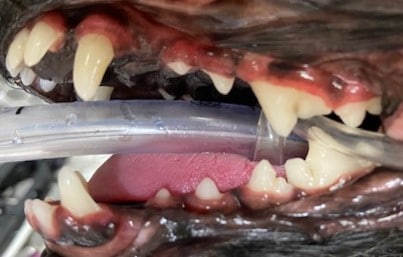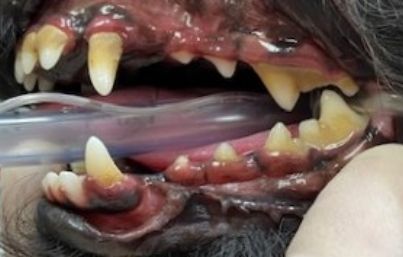Veterinary Dentistry
Protect Your Beloved Pet’s Health With Excellent Dental Care
Did you know that periodontal disease is one of the most common diseases affecting our pets? It is estimated that an upward 70-80% of our pets experience some degree of periodontal disease by the age of 3 years old.
The progression of periodontal disease can result in bad breath (halitosis), the loss of teeth, oral bleeding, difficulty eating, loss of appetite, weight loss, loss of energy, and chronic oral pain. Research shows that bacteria from the mouth can become seeded into vital organs including the heart, liver, and kidneys as well. The side effects of periodontal disease can be largely avoided by multimodal oral hygiene - better known as taking care of your pet’s teeth both at home and at the veterinary dentist.
One part of that better care means visiting Carolina Ranch regularly for your pet’s dental appointments.
At Carolina Ranch, we do not just offer what other veterinary hospitals sometimes call “dentals” - this can be a very dated process uninformed by today’s technology. Our highly advanced process can find a number of diseases that may have gone untreated in the past.
 After
After
 Before
Before
Advanced Dentistry FAQs
On average, it costs between $500-$800 to have your pet’s teeth professionally cleaned, but the cost can vary depending on the condition of your pet’s teeth. Some things that can make dental cleaning more expensive include if your pet has gum damage or needs a tooth extracted. Typically, you should have your pet’s teeth cleaned once a year, but your veterinarian may suggest having it done once every six months if your pet’s teeth aren’t in good condition.
If you have any questions about pet dental cleaning, we’ll be happy to explain the process and our techniques. Call Carolina Ranch to schedule dental cleaning for your pet today!
Keeping your dog’s teeth clean in between dental visits is important for their oral health. Some of the best products that help to keep your dog’s teeth strong and healthy are:
- Dog Toothpaste and Toothbrush
- Dental Dog Treats
- Dental Dog Toys
- Dental Water Additives
- Dental Wipes
If you have any questions on how to keep your dog’s teeth clean at home, call Carolina Ranch today and we’ll be happy to answer any questions you have.
Neglecting your dog’s dental health can cause many health problems for your dog including:
- Gum disease
- Tooth decay
- Painful infections
- Increased risk of heart disease
- Increased risk of diabetes
Keeping your dog’s teeth clean is essential in making sure they are comfortable and live a long, healthy life. Call Carolina Ranch to schedule dental cleaning for your dog today!
Pets should have professional dental cleanings at least once a year to maintain optimal dental health and prevent periodontal disease. Some pets, especially those with existing dental issues or breeds prone to dental problems, may require more frequent cleanings every six months. Regular professional cleanings help remove plaque and tartar buildup that can lead to more serious health issues if left untreated. Always consult with your veterinarian to determine the best dental care schedule for your specific pet.
The best dental care for cats involves a combination of regular home care and professional veterinary services. Brush your cat’s teeth daily with a pet-safe toothpaste to prevent plaque buildup. Provide dental treats and toys designed to reduce tartar. Schedule annual veterinary check-ups, including dental exams, to detect and address any issues early. Professional cleanings may be necessary to remove tartar and treat periodontal disease. Additionally, maintain a balanced diet that supports dental health. Regular dental care helps prevent oral diseases, ensuring your cat’s overall well-being.
Signs of dental problems in pets often include bad breath, excessive drooling, and difficulty eating. You may notice red or swollen gums (gingivitis), discolored teeth, or visible plaque and tartar buildup. Pets with dental pain might paw at their mouths, resist touch around the mouth, or show changes in behavior, like irritability. Left untreated, dental issues can lead to more severe infections and affect overall health. Regular dental check-ups help detect and prevent these common problems.
Common Dental Problems Addressed at Carolina Ranch
- Persistent deciduous teeth
- Malocclusions
- Crown fractures
- Resorptive lesions
- Abscessed teeth
- Loose teeth/Avulsed crowns
- Impacted teeth
- Gingival hyperplasia
- Oral tumors
- Stomatitis
Why is My Cat or Dog’s Oral Care So Important?
At home care, pet dental health care may include routine brushing, water additives, dental treats and/or dental diets routinely. The Veterinary Oral Health Council (VOHC) is a good research for the selection of dental hygiene products for at home care. Each product awarded a seal of approval has been extensively tested and has been proven to minimize the progression of dental disease. Veterinary level care includes routine examinations (1-2 times annually) and routine COHATs (Comprehensive Oral Health Assessments and Treatments), commonly called "dentals", based off your pet’s individual needs.
The Steps of Your Pet’s Oral Care Exam
At Carolina Ranch, we believe in a more comprehensive evaluation system. We are able to provide a comprehensive oral health assessment and treat or “COHAT”. This includes pre-anesthetic screening, extensive intra-operative monitoring, a thorough oral examination, an ultrasonic scaling/polishing of teeth, intra-oral radiography, and the development of a treatment plan based off your pet’s specific hygiene concerns. We believe that routine dental care is pivotal for your pet’s overall well being and quality of life.
Screen: Your pet will be evaluated both through physical examination and blood work to determine they are a good candidate for general anesthesia. Your veterinarian will assess your pet’s overall health and possibly any breed concerns as it relates to anesthesia. The blood work will further assess vital organ function. If your pet passes the initial screens, they may be eligible for a COHAT.
Pre-medication: Once the initial screens are completed, your pet will be administered a pre-medication. This medication is geared towards relaxing your patient and jump start pain control. It often leads to a smoother anesthetic experience. Once your pet is relaxed, an intravenous catheter will be placed. This will allow direct access to your pet’s circulatory system. It will allow for additional drugs to be administered as well as fluid administration. Intravenous (IV) fluids are administered to help with hydration and blood pressure while under general anesthesia.
Induction: After the IV catheter is placed, your pet will receive an induction drug. This medication will make your pet enter a deeper plane of sedation. It will allow for intubation of your pet. An endotracheal tube is placed to help protect your pet’s airway and facilitate gas anesthesia which is critical for the continuity of procedure.
Monitoring: Your pet’s vitals will be continuously monitored while under general anesthesia. This includes temperature, heart rate, blood pressure, pulse oximetry, an EKG, and end tidal CO2. Monitoring continues even after your pet is in recovery.
Diagnostics: Once under general anesthesia, a more thorough assessment is performed. Both extraoral and intraoral examinations are performed. The teeth are evaluated for relative placement, spacing, and stability. Radiographs are performed to further assess the portions of teeth that are not easily visible above the gum line. Radiographs are imperative to the development of a treatment plan for your pet.
Treatment: Your pet’s teeth are cleaned with an ultrasonic scaler and hand instruments where appropriate. After the cleaning, a polisher will be used to smooth the surfaces of your pet’s teeth. The individualized treatment plan is revisited and any additional treatments are rendered.
Recovery: Upon the completion of the COHAT, your pet is removed from gas anesthesia and recovered. Your pet will be continually monitored until discharged.
Call or message us today to arrange a dental visit for your cat or dog. We are happy to explain our techniques to you and we will always ensure your pet is in healthy condition for any needed procedures.




